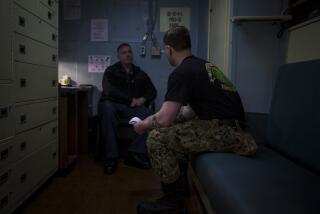Somali Role for Psychiatrists
CAMP PENDLETON — Psychiatrists are playing a key role in preparing American troops for the trauma of seeing starving masses in Somalia and helping Marines to cope with the helplessness they may feel because they are not there to feed the hungry.
At Camp Pendleton, where a large portion of U.S. troops assigned to Somalia are based, worried Marine officials are using Navy psychiatrists to remind departing troops that, at present, their mission is limited to protecting shipments of food bound for starving villagers.
Military officials said the initial reaction of American troops to the suffering and misery in Somalia has underscored the need for psychological briefings for troops still waiting to be shipped there.
“There is no enemy in Somalia, except for starvation and misery,” said Cmdr. Michael Johanek, psychiatrist for the 1st Marine Division. “In combat, dehumanizing the enemy makes it easier to kill him and lessen the guilt. But in this case, we can’t dehumanize starvation.”
Johanek and another Navy psychiatrist are counseling up to 500 Marines at a time at a base auditorium. They show videos of starving Somalis to display the extent of the suffering and to explain that American troops are there to provide security and not to distribute food.
Johanek, 47, a Berkeley native, said military officials worry that young troops might be psychologically scarred because they are helpless to relieve the suffering that surrounds them.
Psychiatrists are stressing to Marines that the responsibility for feeding the starving lies with international relief agencies. In fact, the military’s mission is so narrow that American troops are prohibited from sharing their rations with Somalis. Medical experts say that eating the calorie-rich rations could kill a famished individual whose digestive system has been weakened.
The prohibition against sharing rations with the Somalis could prove agonizing to young Marines, said Lt. Paul Hammer, a psychiatrist at the Navy hospital at Camp Pendleton. “You’re going to have these overwhelming scenes of suffering; being unable to help these people and be generous is sure to have an emotional impact on the troops. . . . We’re telling these young Marines that is a normal reaction to an abnormal situation, and it’s OK to feel that way,” he said.
More to Read
Sign up for Essential California
The most important California stories and recommendations in your inbox every morning.
You may occasionally receive promotional content from the Los Angeles Times.










